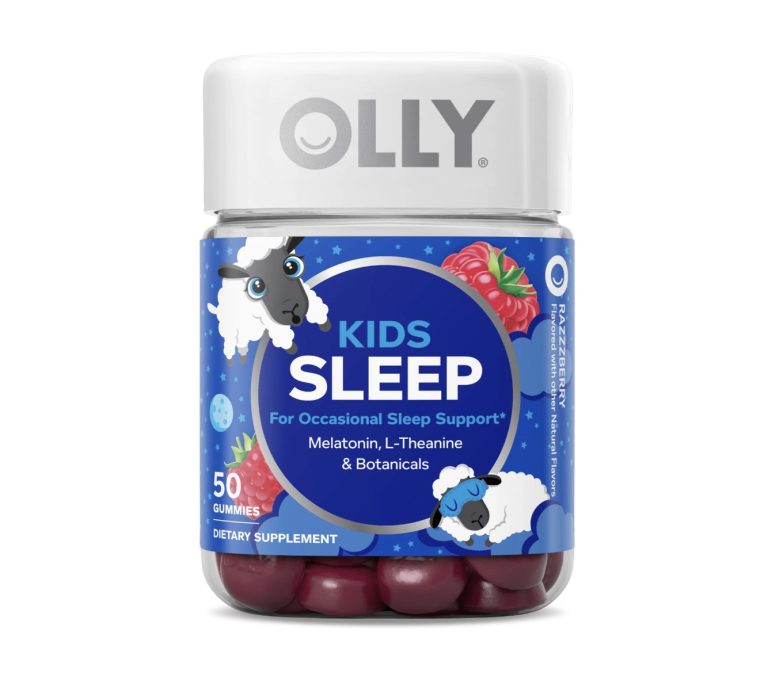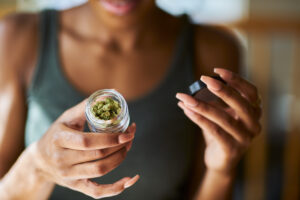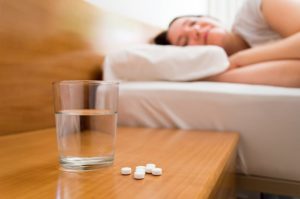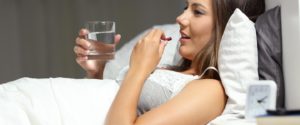When you buy through our links, we may earn a commission. Products or services may be offered by an affiliated entity. Learn more.
Sleep Aids for Kids
- Dietary supplements for sleep may promote relaxation, but are not closely regulated by the FDA.
- There is not enough research to say whether melatonin is safe for kids.
- Speak to a doctor or pediatrician before administering supplements to children.
- Changes to a bedtime routine and sleep environment often help to reduce sleep resistance and improve a child’s sleep.
Sleep problems are estimated to occur in approximately 20% to 30% of children. Many parents and caregivers turn to prescription medications, supplements, and over-the-counter drugs to address these issues. We discuss the benefits and risks of sleep aids for kids, commonly used sleep aids for children, and alternative methods to improve sleep.
Melatonin
Melatonin is a naturally occurring hormone that prepares the body for sleep. Typically, the body ramps up melatonin production when it becomes dark. People can also take melatonin supplements to help regulate their sleep-wake cycle.
Melatonin supplements are most effective at moving sleep times earlier for people whose circadian rhythm, their internal 24-hour clock, naturally runs later than average. Although more research is needed on melatonin for children, evidence suggests that melatonin may also help children with insomnia, including those living with attention deficit hyperactivity disorder or autism spectrum disorder.
Is Melatonin Safe for Kids?
Research on prolonged use of melatonin in children has not found evidence of significant side effects, though studies suggest melatonin supplements could interfere with a child’s development. Short-term side effects may include headaches, agitation, bedwetting, dizziness, and daytime sleepiness. Long-term, melatonin use may trigger early puberty if a child stops taking the supplement.
The Food and Drug Administration (FDA) does not classify melatonin as a drug, so melatonin supplements are not closely regulated. Melatonin supplements may contain more or less melatonin than what is stated on the package, or they may contain unlisted ingredients.
Although melatonin is available over the counter, it is important to talk to a doctor before giving melatonin to any child. A doctor can determine whether melatonin is safe for their situation, particularly if they have other health conditions or take other medications. Experts also warn that it is not appropriate to give melatonin to a child who does not have sleep problems.
“Sleep aids should never be used as first-line treatment for sleep difficulties in children or as a substitute for healthy sleep habits.”
Dr. Pranshu Adavadkar, Sleep Physician
Taking too much melatonin at once can create serious health risks , so parents and caregivers should always store products with melatonin out of the reach of children.
Melatonin Dosage for Kids
Melatonin dosage should always be determined by a child’s doctor. In general, experts recommend melatonin doses for children starting at 1 to 2 milligrams based on a child’s age and the reasons they have trouble sleeping.
Children who frequently wake up during the night might do better with supplements that release melatonin more slowly instead of all at once. Questions about melatonin for children should be directed to a child’s doctor, who can help determine if it is necessary.
Natural Supplements
For adults, natural supplements such as magnesium, L-theanine, chamomile, and valerian are often advertised to help with sleep problems. There is some limited evidence that l-theanine and valerian may help improve sleep for children and teens. However, experts emphasize that there is not enough high-quality research to support using natural supplements for sleep.
Because they are classed as supplements and not drugs, natural sleep aids are not strictly regulated by the FDA, and they may contain impurities. Additionally, some natural substances, such as valerian and kava, have occasionally been tied to severe side effects in adults, such as liver injury.
For these reasons, it is essential to always speak to a doctor before trying natural sleep aids for kids. The doctor may be able to provide information about finding reputable supplements, including melatonin.
Medication
The FDA has not approved the use of any prescription or over-the-counter sleep medication for children under age 16. There is also not enough evidence to say whether pharmaceutical sleep aids are safe or effective for this age group. Experts specifically recommend against giving sleep aids to children younger than 5 years except in very rare circumstances.
Sleep medications often have side effects, such as daytime sleepiness or altered sleep patterns. There is also the risk that a child might overdose or that the medication may exacerbate another health condition. Using medication for sleep on a long-term basis may lead the child to depend on that medication for falling asleep, causing rebound sleep problems when usage stops.
For these reasons, sleep medications should only be given to children after discussing their benefits and downsides with a pediatrician. Doctors may prescribe sleep medication in combination with behavioral therapy for children who have coexisting medical, neurodevelopmental, or mental health conditions.
Parents and caregivers should tell the doctor if their child is taking any other medications or supplements in order to reduce the risk of any complications or drug interactions.
More Ways to Improve Your Child’s Sleep
Experts strongly recommend trying other methods to help children sleep before turning to sleep aids. Many childhood sleep problems can be addressed with behavioral changes and adjustments to the sleep environment.
“Sleep aids can mask or worsen underlying conditions like sleep apnea. It’s important to address the root cause of sleep issues rather than relying on short-term solutions.”
Dr. Pranshu Adavadkar, Sleep Physician
Based on studies in adults, experts in sleep medicine believe that the benefits of behavior modifications last longer than the effects of sleep aids. Even when children take sleep aids, it is important to use behavioral techniques as well. Teaching children healthy sleep habits can help set them up for better sleep throughout their life.
Sleep patterns change throughout childhood and are different from person to person. Parents and caregivers can identify the recommended bedtimes and total sleep times for their child’s age group, which can help establish realistic expectations about their sleep.
Improve Sleep Hygiene
Addressing the habits and behaviors that affect sleep is one of the first things doctors recommend if someone is having sleep problems. Examples of helpful sleep strategies for kids, including children and teens, include:
- Waking up at the same time every day, even on weekends
- Having a consistent bedtime and pre-bed routine
- Turning off screens in the leadup to bedtime
- Using the bed only for sleep
- Getting out of bed and briefly doing something relaxing when having trouble falling asleep
- Taking shorter naps or napping earlier in the day
- Avoiding caffeine, including in soft drinks and chocolate
Reduce Nighttime Distractions
An important part of sleep hygiene involves optimizing the sleep environment. To facilitate better sleep, dim the lights in the leadup to bedtime, and keep the bedroom comfortably cool, dark, and quiet.
Create a Bedtime Routine
Keeping regular bedtimes and following a bedtime routine helps establish a regular pattern for a child’s daily sleep-wake cycle. A typical child’s bedtime routine lasts around half an hour and includes a set of predictable activities, such as getting ready for bed and then reading a story.
If a toddler or older child feels anxious when an adult leaves their room, a stuffed animal or security blanket may provide comfort that helps them fall asleep.
Set Limits
Establishing clear norms and rules about sleep can help facilitate a more consistent sleep schedule. This can help parents resist a child’s attempts to delay or stall bedtime.
Sleep experts also recommend leaving the room before a young child is fully asleep, which can help them get accustomed to falling asleep on their own. Doctors can recommend a more specialized sleep training method to help young children learn to self-soothe.
Address Underlying Causes
Sleep problems sometimes occur due to sleep disorders, pain, or medications, which need to be properly addressed in their own right. If parents and caregivers suspect their child has an undiagnosed condition affecting their sleep, they should ask a pediatrician for guidance or for a referral to a specialist.
After years of having trouble falling asleep, older children may become anxious at the prospect of bedtime. These children may find it helpful to relieve sources of stress, improve sleep hygiene, or try cognitive behavioral therapy for insomnia.
Medical Disclaimer: The content on this page should not be taken as medical advice or used as a recommendation for any specific treatment or medication. Always consult your doctor before taking a new medication or changing your current treatment.

Still have questions? Ask our community!
Join our Sleep Care Community — a trusted hub of sleep health professionals, product specialists, and people just like you. Whether you need expert sleep advice for your insomnia or you’re searching for the perfect mattress, we’ve got you covered. Get personalized guidance from the experts who know sleep best.
References
5 Sources
-
Owens, J. A. (2023, January 3). Pharmacotherapy for insomnia in children and adolescents: A rational approach. In R. D. Chervin (Ed.). UpToDate.
https://www.uptodate.com/contents/pharmacotherapy-for-insomnia-in-children-and-adolescents-a-rational-approach -
Lelak, K., Vohra, V., Neuman, M. I., Toce, M. S., & Sethuraman, U. (2022). Pediatric Melatonin Ingestions — United States, 2012–2021. MMWR Morbidity and Mortality Weekly Report. 71, 725–729.
https://www.cdc.gov/mmwr/volumes/71/wr/mm7122a1.htm -
Anand, S., Tong, H., Besag, F. M. C., Chan, E. W., Cortese, S., & Wong, I. C. K. (2017). Safety, tolerability and efficacy of drugs for treating behavioural insomnia in children with attention-deficit/hyperactivity disorder: A systematic review with methodological quality assessment. Paediatric Drugs, 19(3), 235–250.
https://pubmed.ncbi.nlm.nih.gov/28391425/ -
France, K. G., McLay, L. K., Hunter, J. E., & France, M. L. S. (2018). Empirical research evaluating the effects of non-traditional approaches to enhancing sleep in typical and clinical children and young people. Sleep Medicine Reviews, 39, 69–81.
https://pubmed.ncbi.nlm.nih.gov/28918314/ -
Owens, J. A. (2020, August 18). Behavioral sleep problems in children. In R. D. Chervin (Ed.). UpToDate.
https://www.uptodate.com/contents/behavioral-sleep-problems-in-children











